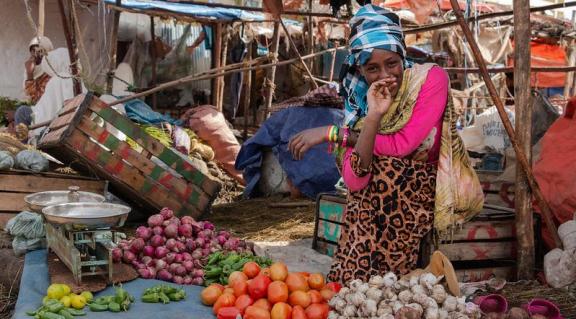
The COVID-19 crisis is creating shocks across multiple sectors and systems that are essential to improving and safeguarding nutrition. USAID's Guiding Principles and Recommendations for Nutrition in the Context of COVID-19 summarized the likely impacts of the COVID-19 crisis on nutrition and proposed guiding principles for priority actions during the response and recovery phases.
USAID sought to learn from implementers and colleagues working in different countries who have pivoted their activities to respond to COVID and protect progress on nutrition goals in development contexts. These two webinars gave everyone the opportunity to learn from several practitioners’ experiences in applying USAID’s guiding principles.
Webinar Recording #1 (8/11/20)
Webinar Recording #2 (8/13/20)
Webinar Resources
- The Integrated Community Agriculture and Nutrition (ICAN) Activity (PDF, 3.8 MB)
- Safeguarding Progress Towards Improved Nutrition During the COVID-19 Pandemic- BUDIKADIDI Experience (PDF, 22.8 MB)
- Alliance for Inclusive and Nutritious Food Processing (PDF, 6.7 MB)
- Adapting for Covid-19 FTF Bangladesh Livestock Production for Improved Nutrition (PDF, 4.8 MB)
- Adaptation by a large-scale integrated nutrition program in the context of COVID-19 (PDF, 12.7 MB)
- View webinar transcript (PDF, 328 KB)
Speakers
Pooja Pandey Rana joined USAID’s Suaahara Good Nutrition Program as its Deputy Chief of Party in 2011. She provides nutrition programming guidance to the Government of Nepal and program partners in defining, implementing and monitoring the project’s strategic approaches. Pooja has more than 20 years of experience in program management, community driven development models, primary health care system, performance-based monitoring and evaluation including 15 years with USAID. Her main interests focus on addressing multi sectoral dimensions of malnutrition in South Asia especially in Nepal. She holds a degree in Master of Science in Public Health from the London School of Hygiene and Tropical Medicine.
Jonathan Thomas is the Chief of Party with TechnoServe on the USAID-funded Alliance for Inclusive and Nutritious Food Processing (AINFP) program based in Nairobi, Kenya, and before this was the CoP on the Solutions for African Food Enterprises (SAFE) program. Both these programs are a public private partnership with Partners in Food Solutions aimed at transferring expertise from employees of world-class companies (General Mills, Cargill, Royal DSM, Bühler, the Hershey Company, Ardent Mills and Smucker’s) to small and growing food companies in Africa. AINFP currently operates across 5 countries – Ethiopia, Kenya, Tanzania, Zambia and Malawi – where it aims to improve the competitiveness of these companies to produce safe, nutritious and affordable foods. Prior to TechnoServe Jonathan has worked for more than 20 years in the East and Southern Africa region, with a range of NGOs focused on sustainable livelihoods, local economic development and market systems. He has a background in agriculture and land management.
Muhammad Nural Amin Siddiquee is the Chief of Party of our Feed the Future Bangladesh Livestock Production for Improved Nutrition and ACDI/VOCA’s country representative in Bangladesh. Prior to joining ACDI/VOCA in 2017, he served as a technical advisor for CARE USA, supporting programs in 10 countries throughout Africa and Asia. He holds a MS in aquatic tropical ecology from the University of Bremen (Germany), a MS in fisheries, and a BS in zoology from the University of Dhaka. Nurul Siddique coauthored Making Market More Exclusive: Lessons from Care and the Future of Sustainability in Agricultural Value Chain Development, published by Palgrave Macmillan in 2014.
Esther Naluguza is a Public Health & Nutrition specialist, with over 10 years of experience in design, and implementation of health and nutrition programs at national, district and community levels. She is currently working as the Nutrition Technical Lead for the USAID Integrated Community Agriculture and Nutrition (ICAN) Activity, implemented by Abt. Associates in Uganda. Before this, Esther worked for five years with Elizabeth Glaser Pediatric AIDS Foundation, (EGPAF) as the Senior Technical Advisor- Nutrition and WASH, for the USAID Regional Health Integration to Enhance Services (RHITES) in South West Uganda. She has a background in Human Nutrition and Dietetics, and Public Health.
James Laud Quarshie is the Chief of Party for the $38 Million Budikadidi Development Food Security Activity (DFSA) funded by USAID FFP implemented in Kasai Oriental since December 2016. His job includes coordination of program activities among consortium partners, CRS, NCBA CLUSA, Tufts University, Caritas Mbujimayi, REFED and RACOJ as well as the government of the DRC. Prior to this position, James worked for 7 years as the Chief of Party of PASAM-TAI and PROSAN which were both Title II programs implemented in Maradi and Zinder in Niger. James had also worked for 4 years as the Compliance and Coordination Unit Coordinator (Chief of party) for the Liberia Integrated Assistance Program (LIAP). Where he ensured that the program’s strategic objectives and results were accomplished to meet expected technical quality standards. He led the food logistics and M&E sections to ensure efficient commodity management systems and effective monitoring of program activities as well as end use checking.